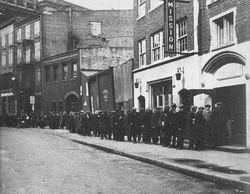
We at SSWM are fascinated by Asset Pricing, Behavioral Finance, and the Economy. Following the global economy, over the past 6 years, has been a free Masters in Economics. When the real estate bubble burst in 2008-2009, it triggered one of the ugliest recessions seen since the Great Depression. We call it the Great Recession. It's not over, we continue the recovery and new repercussions continue to surface. A painful lesson for all, but absolutely fascinating to be living it.
Our feeling at SSWM is that the housing industry created more units than consumers income could support. Production, and consumption, was fueled by subprime mortgages. Over 90% of the mortgages were high risk adjustable-rate loans. Lower lending standards and increasing consumer debt added additional fuel. Feeling confident, and using housing equity as ATMs, the debt to disposable income ratio increased from 77% in 1990 to over 125% by the end of 2007. When home prices peaked, and then declined, consumers began to default on payments, foreclosures occurred, and housing (mortgage) back securities began to devalue. Consumers reduced investment spending and business investment followed. There is/was a direct correlation between the reduction in spending and the size of household debt. The greater the devaluation a household experienced, the greater the debt, the greater the reduction in spending.
Our feeling at SSWM is that the housing industry created more units than consumers income could support. Production, and consumption, was fueled by subprime mortgages. Over 90% of the mortgages were high risk adjustable-rate loans. Lower lending standards and increasing consumer debt added additional fuel. Feeling confident, and using housing equity as ATMs, the debt to disposable income ratio increased from 77% in 1990 to over 125% by the end of 2007. When home prices peaked, and then declined, consumers began to default on payments, foreclosures occurred, and housing (mortgage) back securities began to devalue. Consumers reduced investment spending and business investment followed. There is/was a direct correlation between the reduction in spending and the size of household debt. The greater the devaluation a household experienced, the greater the debt, the greater the reduction in spending.

The solution to a recovery? Pump money into consumers pockets, redistribute the purchasing power and re-inflate prices and wages. Inflationary increases should stimulate consumer spending. Use zero percent interest rates to encourage investment and investment spending. When consumers have confidence in the economy, they spend more.
Here we are in 2014 and we begin reflecting on who has benefited from the Great Recession and the ongoing recovery. The Russell Sage Foundation has published an incredible paper entitled, Wealth Levels, Wealth Inequality, and the Great Recession. In two pages, the paper gives a great update on where we stand as a nation. The stock market has rebounded, but the number one source of wealth for most Americans, their homes, has not. Houses are still 28% below their 2007 value levels.
Here we are in 2014 and we begin reflecting on who has benefited from the Great Recession and the ongoing recovery. The Russell Sage Foundation has published an incredible paper entitled, Wealth Levels, Wealth Inequality, and the Great Recession. In two pages, the paper gives a great update on where we stand as a nation. The stock market has rebounded, but the number one source of wealth for most Americans, their homes, has not. Houses are still 28% below their 2007 value levels.
Everyone got hit hard during the Great Recession, what is interesting (as the Table above shows) is who has been able to recover. Those at the median family wealth level (50th percentile) saw their net worth increase over 12% during the period from 2003 to 2007. At the higher end of the spectrum, 75th, 90th and 95th percentiles, wealth increased by as much as 37%. By comparison, at the lower end of the spectrum, wealth at the 25th percentile declined by over 31%. Those at the 5th percentile, who were already in rough shape, continued to get pummeled. Between 2003 and 2007, wealth levels declined for all those except the 90th and 95th percentile.

What a scare it was to experience the market losing 50% of its value between the middle of 2007 and early 2009. Some individuals, so horrified, cashed out and never returned. It was a time when you could actually anticipate cash drying up, the economic machine grinding to a halt and the bread lines of the '30s returning. The times that try men's souls.
With help from the Federal Reserve economic stimulus programs, stocks were able to rebound relatively quickly between 2007 and 2009. Housing was not so lucky. Median wealth, not held in real estate, declined by about 30% between 2007 and 2013, compare this to the decline in median total net worth of 43%. Affluent households are more apt to have large diversified portfolios and hold assets in stocks, less affluent individuals sought asset value in home ownership. As a result, the rich got richer, the rest got poorer. Even the 75 percentile were not immune as they saw wealth decline and not to return to 2003 levels.
With help from the Federal Reserve economic stimulus programs, stocks were able to rebound relatively quickly between 2007 and 2009. Housing was not so lucky. Median wealth, not held in real estate, declined by about 30% between 2007 and 2013, compare this to the decline in median total net worth of 43%. Affluent households are more apt to have large diversified portfolios and hold assets in stocks, less affluent individuals sought asset value in home ownership. As a result, the rich got richer, the rest got poorer. Even the 75 percentile were not immune as they saw wealth decline and not to return to 2003 levels.

From the RSF study, Figure 1 shows net worth values for the same percentiles studied above, but relative to 1984. Wealth grew substantially during the two decades prior to the Great Recession. The growth rate, again, is much higher at the top end of the quartiles. Net worth for the 95th percentile more than doubled between 1984 and 2007, the median (50th percentile) grew at 40%. Wealth at the lower end of the scale was basically flat and then declined dramatically, even before the onset of the Great Recession. Wealth inequality was increasing before the crisis. Looking at the period from 2008 to 2013 - 95th % <> wealth doubles; 75th % <> wealth increases by 1/3rd; Median falls by 20%; the 25th %'s wealth has fallen by more than 60%.

Figure 2 depicts wealth ratios at various percentiles of the distribution curve. Households at the 50th (median) had 8.7x the net worth of those at the 25th; by 2009 the ratio was 26.0x. The gap remains 2x the size that it was a decade prior. Study this chart, in 2003, the 95th percentile held 13.6x more wealth than the median household. Since then, this gap has increased to 20.1x in 2009 and 24.2x in 2013.
It will be interesting to see how long it takes, if ever, for households to recover from the Great Recession. Declines from 2007 to 2009 were huge and continued for over four years through 2013. Wealth inequality widened between 2003 and 2013, looks like it nearly doubled. We have dug a very deep hole. Expect the gap to widen as the hardest hit in the Great Recession continue to tap the few assets they have left to cover current consumption and spending.
It will be interesting to see how long it takes, if ever, for households to recover from the Great Recession. Declines from 2007 to 2009 were huge and continued for over four years through 2013. Wealth inequality widened between 2003 and 2013, looks like it nearly doubled. We have dug a very deep hole. Expect the gap to widen as the hardest hit in the Great Recession continue to tap the few assets they have left to cover current consumption and spending.

Here at SSWM, we value time, education, family, relationships, health and the well being of our fellow man above all else, but, value appreciation is at the forefront of our financial philosophy. Income is nice, but creating wealth is the key. What percentile are you in? How do you feel about housing as an asset? Are you in recovery mode? Sua Sponte.
| If you would be wealthy, think of saving as well as getting. -Benjamin Franklin | |
Bradford C. Bruner for Sua Sponte Wealth Management



















































